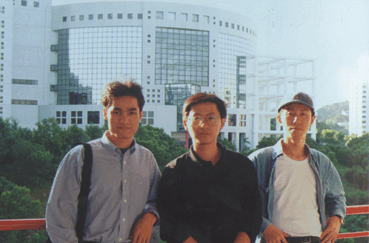One country two education systemsby Christine Au One country, two systems” is not applicable only in the political realm. It also reflects the differences between students from Hong Kong and China. It is not unusual for Hong Kong university students to work all though the night. However, for university students from China, such a life is beyond belief. Said Mr. Qiu Lin Chun, a graduate of Peking University: “In Beijing, students have an average of eight hours’ sleep and an afternoon nap.” Mr. Qiu studied in the Department of International Politics when he was in Beijing and is presently working as a research assistant at The Chinese University of Hong Kong. Mr. Pan Tiao Feng, president of the Association of Students and Scholars from China, also said Hong Kong students are “hard working”. He studied mathematics at Shandong University.
Qiu Lin Chun (right) at the University of Science and Technology.Nonetheless, some people say that students from China are more sophisticated, seeing things from a wider perspective. Mr. Tsang Yok Sing, supervisor of Pui Kiu Middle School, agrees. “They have a more mature mentality, willing to spend time thinking about solemn topics,” Mr. Tsang said. More reading may account for this sophistication. Books are cheap in China. Also, few students possess television sets, so they spend less time in front of the tube.. Furthermore, schools in China hold many seminars for students, broadening their knowledge. Mr. Qiu said, “In Beijing, there were three to four seminars or exhibitions every day. Thus, we had more opportunities to engage in self-exploration and learning.” Hong Kong students have been criticized for being ignorant about Chinese culture and history. The president of the Hong Kong University Students’ Union, Mr. Wong Chun Sing, admitted this to be the case. He said, “The situation would be alleviated if Hong Kong students had more relatives and connections in the Mainland.” Said Mr. Joe Nip, external vice-president of the Hong Kong Youth Tertiary Students Association: “In China, only 6 percent of teenagers can receive a tertiary education. Thus, university students treat their opportunity to be educated as a valuable one.” Mr. Nip is an active participant in exchange programs to China. The teacher-student ties in China are also closer. Said Mr. Qiu: “Teachers and schoolmates all live together under the same roof, providing more occasions for the flow and interaction of ideas. Mr. Pan said, “Comparatively speaking, Hong Kong students are more self-centred. Education should bear most of the blame. Students are not taught the consciousness to serve. They are not prepared to make sacrifices for the community as a whole. They lack group spirit,” Mr. Nip said. Apathetic attitudes among Hong Kong students are reflected by their lack of participation in social events. “Many of them do care what is happening around them, but when it comes to real action that consumes their time, they retreat,” said Mr. Wong. In China, according to Mr. Nip, in spite of the limited resources and the absence of formal channels to voice their discontent, students are anxious to know more about their country. “They are fervent to serve and make sacrifices. Some of them have said to me that, as a Chinese citizen, it is an important responsibility to join the army and protect the country,” said he. “Chinese students have a stronger sense of belonging towards the
country,” said Mr. Yeung Yiu Chung, the principal of Heung To Middle School.
“China is a faraway concept to Hong Kong students. They are still searching for their
roots.” |
